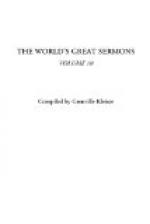This spirit of hate has had at least one holiday at the expense of Christian faith. On the night of the 18th of July, 64, Rome was swept with fire. Six days and nights it raged. Ruined was the world’s metropolis and excited were the wo-stricken people. Nero, whose opinions of Christianity, by the way, were wonderfully like the orator’s, was king, and the people suspected that this royal monster did it. Men told of how he exulted over the sea of flame as he watched it from the tower of Maecenas; and whatever the truth of this may be, it is certain that for the rage of the people Nero must have a victim, and Tacitus tells us that he charged the Christians with the crime. Then opened in Rome the awful carnival of bloodshed that the orator never mentions, in which horrible modes of torture and excruciating methods of producing pain vied with each other in satisfying the demands of death. Women bound to raging bulls and dragged to death were not without the companionship of others who, in the evening, in Nero’s garden, were coated with pitch, covered with tar, bound to stakes of pine, lighted with fire, and sent to run aflame with the hatred of Christianity. Through the crowd of sufferers a gentleman, who was ultra-liberal as the orator, drove about, fantastically attired as a charioteer, and the people were wild with delight. Domitian had the same ideas, and severe were his persecutions of the new heresy. This was the day on which infidelity was so full of the love of freedom that it cried: “The Christians to the lions!”
And so I might recount to you how for hundreds of years the Church found out how early and unchristianized infidelity loved freedom of thought. To a type of liberals, it has for years seemed a joy to go to the places in the old world and note how intolerant the Church has been. Now I suggest to any one that he go and visit some of the places where men who thought of Christianity as negativism thinks showed their faith and its fruits. Let him go to the Colosseum and ask the winds that moan over its ruins what they know of the history of infidelity. The winds will hush in that wreck of stupendous magnificence, and with an eloquence gathered from seventeen centuries they will tell him a story that will cause a flow of tears, for much of infidelity is of noble heart. They will tell him how the marble seats were crowded with thousands; again will sweep upward the shout of the excited throng; before him there will lie a half-dead Christian martyr, and near that pool of blood will stand a lion who has satiated his horrid thirst.




